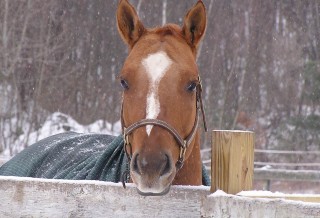Can Horses Get Frostbite?
30.01.2014

"Horses can get frostbite, although it's much rarer than it is in humans," explains Dr. Ginger Reed, an Associate Ambulatory Veterinarian with Rood and Riddle Equine Hospital in Lexington, Kentucky. "Horses have a bunch of protective mechanisms that allow them to handle colder temperatures."
In humans, doctors typically advise extra caution in cold weather for children and senior citizens. The same is true for horses. Reed recommends that owners keep an eye on foals and geriatric horses during cold snaps. Horses that have gone through illness recently are also more at risk of frostbite.
"Horses that have any sort of metabolic disease or insulin resistance have a compromised ability to regulate their body systems," Reed explains. "Generally, horses that have recently been sick won't be able to handle cold the way they normally could."
Extreme cold alone won't usually cause frostbite in horses, so some turnout time during a polar vortex is usually OK if the horse is accustomed to regular winter turnout. But prolonged exposure to cold can be dangerous to an at-risk equine.
"Duration of exposure is worse than extreme cold," says Reed. "If a horse is out in five-degree weather for three days, that's worse than being exposed to 20 below for a short time. Humidity and rain will also affect horses' ability to fight off the cold. Any wet environment increases the risk of frostbite."
In the rare cases that horses do get frostbite, it is most likely to be on their extremities—the tips of their ears or their legs. It usually first appears as skin discoloration. It can be a loss of pigmentation or a darkening of the skin. The affected area may become red and blistered. Because of horses' thick winter coats, frostbite may go unnoticed for a few days. It can take weeks for the true extent of the damage to be revealed.
If you think your horse may have frostbite, contact your vet. Bring the horse into the barn or shelter, but don't try to warm up the affected area by rubbing it as that could cause additional tissue damage. Your vet will examine your horse to determine the prognosis.
"If the vet detects a pain response, that's actually a good thing," says Reed. "If they have sensation in that area, that means there's tissue there that's still active. If the area has lost sensation, that's a bad sign."
Fortunately, practicing good winter horsekeeping techniques is usually enough to prevent frostbite.
"If horses are going to live outside, they need a covered, three-sided shelter to get out of the wind and precipitation," says Reed. "Have more hay available. People tend to want to give more grain when it's cold, but hay is better because it takes longer to digest. It goes through a fermentation process in the horse's digestive system that actually produces body heat. Make sure they have extra hay and plenty of fresh, unfrozen water available."
Keep an eye on foals, senior horses and horses that have had recent health issues, but remember that horses are generally able to weather the winter quite well.




